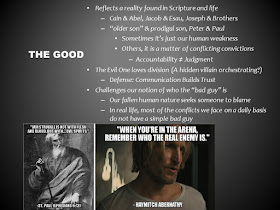"If this had been done by an enemy, I could bear his taunts... But it is you, my own companion, my intimate friend!" - Psalm 55
The relevance of the trend of "brother v. brother" or "hero v. hero" stories is especially prominent this year, as we have seen the two major brands of comic book superheroes (Marvel and DC) pit their two main heroes against each other in epic blockbusters. It is a rather different concept, which causes a great many to flock to the theaters, while still plenty others scratch their heads and say "I don't get it. Why are they fighting each other?" So, it is worth taking a moment to consider what the implications are. We can recognize a blend of positive elements, and others of which are rather alarming.
Still, there are certain false and dangerous ideas which these kind of stories could work to promote...
The above quote came from Fr. Barron's review of Avengers: Age of Ultron. As I expressed in my own review (here), I have a different perspective, and the difference seems particularly relevant.
Fr. Barron's (now Bishop Barron) description of the Nietzschean idea of 'beyond good and evil' is very helpful, as are his warnings of the potential implications within the movie. However, his overall perspective on the movie seems to be...
Movie = Nietzschean Parable
The character of Vision = Nietzsche's Mouthpiece
He describes Vision as: “produced by the flexing of the all too human will to power… this pseudo-savior was brought about by players on both sides of the divide, by both Iron Man and Ultron. Like Nietzsche’s superman, he is indeed beyond good and evil.”
Fr. Barron's (now Bishop Barron) description of the Nietzschean idea of 'beyond good and evil' is very helpful, as are his warnings of the potential implications within the movie. However, his overall perspective on the movie seems to be...
Movie = Nietzschean Parable
The character of Vision = Nietzsche's Mouthpiece
He describes Vision as: “produced by the flexing of the all too human will to power… this pseudo-savior was brought about by players on both sides of the divide, by both Iron Man and Ultron. Like Nietzsche’s superman, he is indeed beyond good and evil.”
My initial response is in the words of the Vision himself...
Furthermore, as I stated in my own review: "One
of the gifts of (director) Joss Whedon is to use the dynamic of each diverse
character in the ensemble to offer different perspectives on themes of human
life and society. You should not look to
a Whedon
movie/show (or I would add to any good story) expecting that any one character
has all the answers or is responsible for spoon-feeding us the message we are
supposed to take from it. I’m pretty
confident that's not how Whedon
operates, and I'm thankful for that."
So, my general view in response is...
Vision
≠ Nietzsche’s
Mouthpiece
Movie
= complex reflection of human nature, brokenness and redemption
The importance of these perspectives to the current presentation lies in the fact that Age of Ultron introduced the idea of calling into question who the villain is (especially because the villain was created by one of heroes), showed the evil that can result when mistrust seeps in among the heroes, and generally was among the most important movies, which set the stage for Marvel's big 'brother v. brother' movie: Captain America: Civil War. So, it matters going in whether or not they have already introduced this Nietzschean notion as the predominant philosophy underlying the larger story. I would argue that they have not done so.*
Last, but not least, the final value of this type of story is found in considering stories like the prodigal son and Jacob and Esau...
*Now, having seen the movie, I do not think this philosophy was pervasive within. I do think, however, that one of the biggest weaknesses was that it tended toward relativism, as Captain America's motivations were rather weak and not as grounded in truth as they ought have been. For more on that, I recommend this article. While I'm at it, here is a good response to Batman v. Superman, with which my thoughts resound.




No comments:
Post a Comment